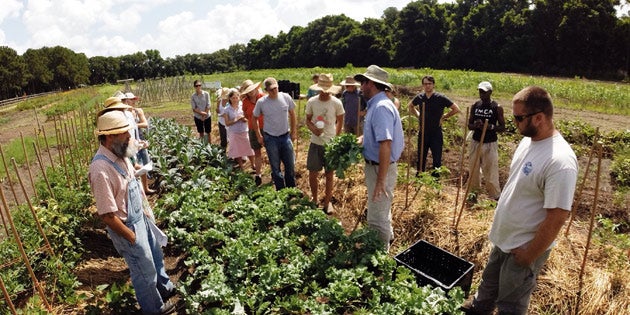Farm-to-school. Do you know this phrase? It’s been resonating across the Lowcountry for a couple of years now. Recently, it’s begun to extend across the Palmetto State. And, if College of Charleston professor Olivia Thompson ’99 has her way, it will eventually become a household term.

Due out this month, “The Garden STEM” will assist teachers in integrating garden lessons into the classroom.
Farm to school is a simple concept. It involves the creation of school-based gardens that provide learning opportunities for students, along with fresh and nutritious food for them, too. But it also involves linking local farms with school cafeterias. And the person most responsible for getting this initiative off the ground in South Carolina is Thompson, an epidemiologist and public health specialist who is also an alumnus of the College.
“Our Farm to School program started out as a pilot initiative at public schools in the Charleston tri-county area,” explains Thompson. “The program is funded by Boeing South Carolina, and we’re fortunate to have this backing because the initiative influences not only education, but public health and an appreciation for our environment as well.” Over the coming year, says Thompson, the program will expand from Berkeley, Charleston, and Dorchester counties to include counties across the state, specifically in those where the Medical University of South Carolina’s Boeing Center for Children’s Wellness has worked to help schools implement wellness policies.
One of the outgrowths of this initiative is a new book that is being released this month, “The Garden STEM.” According to Thompson, the book offers a blueprint for teachers at schools where new gardens are being implemented. She says that the initiative hired teachers from Charleston’s tri-county area schools to develop this book as a textbook. “It’s a supplement that will help teachers integrate lessons from the gardens into their classroom curriculum. And it’s been developed to meet and complement South Carolina state education standards.”
Thompson is excited about the potential that the expansion of this initiative offers. “This is really a social movement, and it creates an atmosphere of optimism and excitement about eating for optimal health and wellness, and that is important for a number of reasons. Research firmly shows that healthy people drive community economic development. In addition, school gardens are particularly formative for students because they serve as outdoor classrooms that integrate lessons from multiple disciplines including math and science, art and communication. But equally important is that school gardens are also useful for teaching soft skills, such as how to work together and how to persevere and the benefits that come from having a gritty outlook.”
To hear Thompson explain more about the Farm to School initiative, check out this podcast from the South Carolina School Boards Association.




